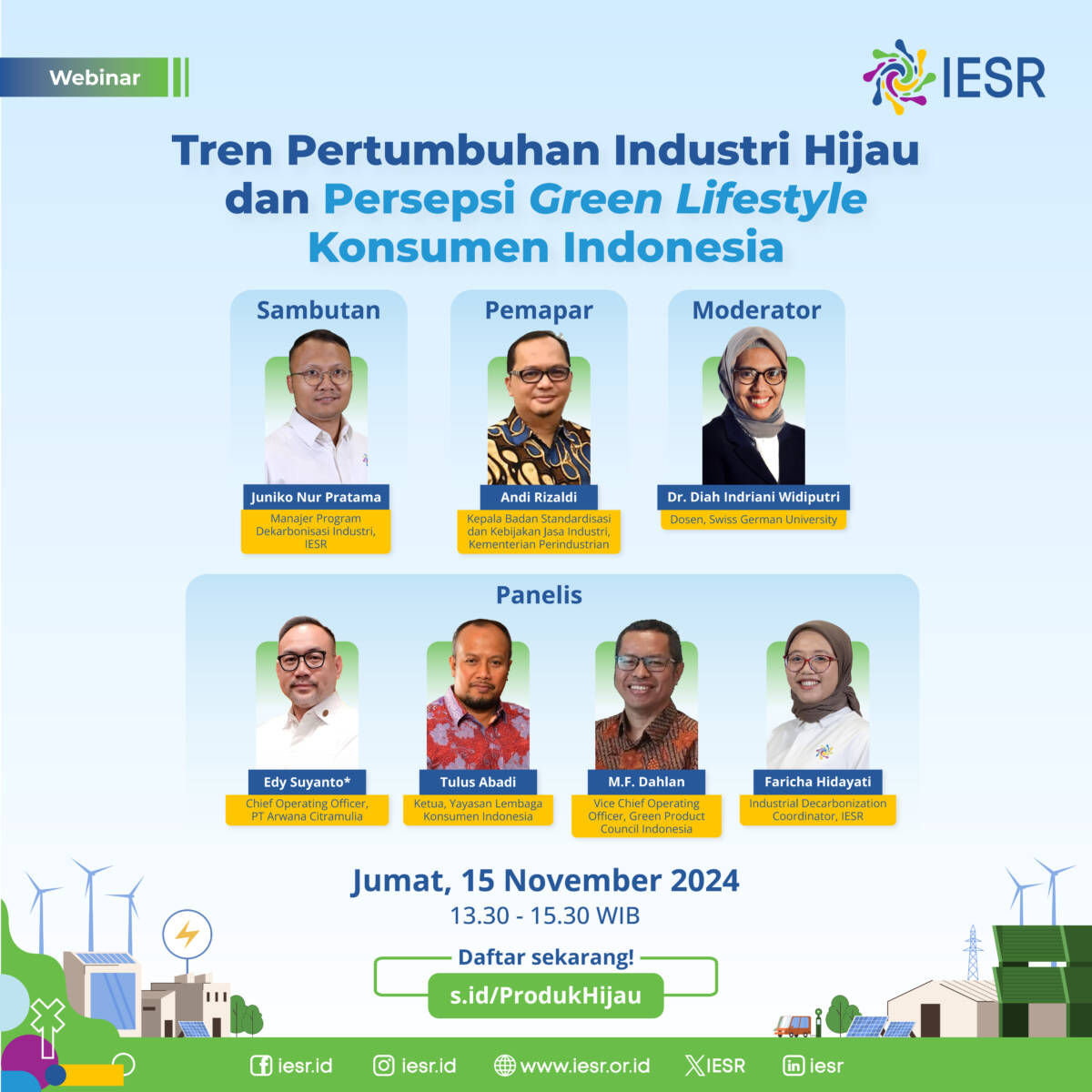
Webinar: Green Industry Growth Trends and Green Lifestyle Perceptions of Indonesian Consumers
Replay Event
Background
The Government of the Republic of Indonesia has created a multi-sector strategy to support the achievement of the Net Zero Emission target by 2060 or sooner. Through the Enhanced NDC document, Indonesia is committed to reducing carbon emissions by 31.89 percent with its own efforts and 43.2 with international assistance by 2030. Meanwhile, current greenhouse gas emissions from the industrial sector in Indonesia continue to increase from 2011 to 2022, with total emissions in 2022 reaching more than 400 million tons of carbon dioxide equivalent.
In his speech, Minister of Industry Agus Gumiwang Kartasasmita said that decarbonization of the industrial sector is a concern for Indonesia due to factors such as market shifts for green production along with increased greenlifestyle awareness, raw material supply vulnerability due to climate crisis, regulations of Indonesia’s export destination countries that require sustainable practices, plans to implement a national carbon market and contribution to the country’s commitments in international conventions.
At the industrial scale, at least 4 main steps need to be taken in order for an industry to ensure emission reduction in its production process, namely: (1) comprehensive greenhouse gas (GHG) emission inventory, (2) clear GHG emission reduction target, (3) emission reduction strategy development and planning, and (4) monitoring and verification of emission reduction strategy implementation. These stages need to be carried out in a transparent and verified manner so that the industry can claim to be a producer of environmentally friendly products.
Green products have become an important and strategic issue for the national industry to respond to global market demands related to the harmony of industrial development and the preservation of environmental functions. In line with Law No. 3/2014, this can be done by implementing and developing the concept of agreen industry system, starting from the procurement and use of input materials that are environmentally friendly and produced using environmentally friendly machinery or technology and effective waste handling. In order to accelerate the development of green industry, since 2017 the Ministry of Industry has established Green Industry Standards (SIH) as a reference in implementing green industry for industrial companies and providing facilitation of green industry certification assistance.
In an effort to encourage interest in fulfilling green industry certification, several benefits are offered when the company has certified such as (1) Getting fiscal and non-fiscal facility assistance by the Central Government and Local Government (2) Industries that have obtained Green Industry Certificates from LSIH-BBSPJIA are allowed to use the Green Industry Logo on product packaging, product labels, company letterhead, company business cards and / or company promotional media during the certification validity period. In 2024, there are 44 companies from 19 commodities that have been determined to obtain green industry certificates as an implication of efforts to reduce emissions in industrial processes.
Looking at the market point of view, the trend of green lifestyle development in the global community is starting to increase along with various environmental campaigns carried out. The Healthy & Sustainable Living 2023 report states that there is an index of increasing green lifestyle in society compared to 2019 where people choose to bring their own shopping bags (67% from 63%), recycle waste (59% from 53%), avoid using single-use plastics (46% from 42%), and buy organic products (41% from 37%). An interesting point mentioned in the report is that 72% of consumers interviewed in the study said that they want more information on how companies are making their products better for the environment. This should certainly be welcomed by companies and the government to come up with a more informative mechanism regarding the standardization of green products in Indonesia.
However, the choice to live a green lifestyle is hampered by the fact that products labeled as sustainable products currently have a relatively high price, which means that the green lifestyle depends on the level of purchasing power of the people to fulfill their overall needs. This is due to the need for investment in low-carbon technology, which is generally a burden on the company’s capital at the beginning, which has implications for adjusting the price of goods. Therefore, it is necessary to ensure that the transition mechanism towards low-carbon production processes does not become a burden to increase the price of goods and reduce people’s purchasing power.
Presentation
BSKJI – Kemenperin (Ministry of Industry) _ Green Product Supply Demand Development
Perkembangan-Supply-Demand-Produk-Hijau-BSKJI-KemenperinSpeakers
-
Fabby Tumiwa - Direktur Eksekutif IESR
-
Faricha Hidayati - Koordinator Proyek Dekarbonisasi Industri - IESR
-
Andi Rizaldi - Kepala Badan Standardisasi dan Kebijakan Jasa Industri (BSKJI) Kementerian Perindustrian (Kemenperin)
-
Joko Yulianto - Factory Director PT Sarihusada Generasi Mahardhika (SGM)
-
Tulus Abadi - Yayasan Lembaga Konsumen Indonesia
-
M.F. Dahlan - Vice COO Green Product Council Indonesia
-
Dr.-Ing Diah Indriani Widiputri - Swiss German University

